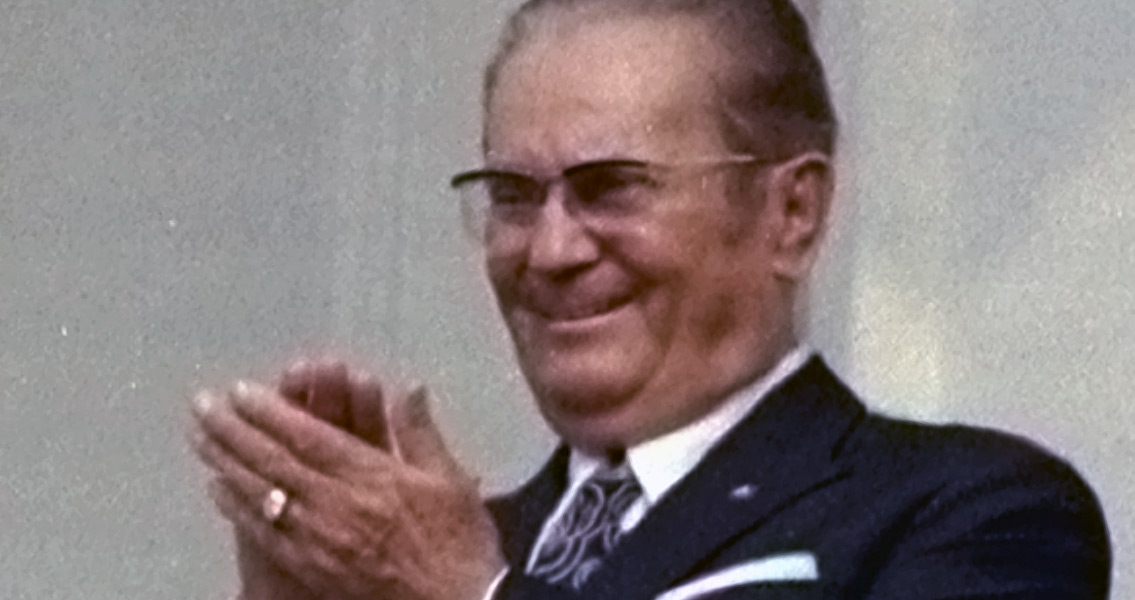<![CDATA[On 4th May, 1980, Josip Broz Tito, communist leader of Yugoslavia, passed away in Belgrade. Ruling since 1945, Tito was unique in overseeing a strict adherence to the ideas of Marxism while also remaining independent from the Soviet Union. Tito was born near Zagreb, in what is now Croatia, in 1892. He was raised in an impoverished family and worked as a mechanic until being conscripted into the Austro-Hungarian Army on the advent of the First World War in 1914. While fighting in the war Tito was captured by Russian forces. He converted to communism and in 1917 played an active role in the Russian Revolution. Following Austria-Hungary's surrender, he returned to the newly created Yugoslavia and became involved in the country's politics. The banning of communism in 1928 saw Tito sentenced to five years imprisonment. Once released, he returned to the Soviet Union and started to work for the Comintern, the international organisation that advocated world communism. After Yugoslavia's invasion by the German Army during the Second World War, Tito returned to aid the partisan resistance fighters. The resistors to Nazi occupation eventually received aid from the Allies, and gradually started to push back the German forces, establishing a government in Bosnia in 1943. In 1945, Tito became premier of Yugoslavia, and set about creating a confederation of socialist republics, including Bosnia-Herzegovina, Croatia, Macedonia, Serbia and Slovenia. The first years of Tito's government saw him work aggressively to secure his position in power. The Yugoslav political system was swiftly purged of non-communists and fraudulent elections took place to justify the abolition of Yugoslavia's monarchy. Following the declaration of the Yugoslav Republic in November 1945, a host of show trials took place of accused Nazi collaborators, distrusted members of the communist party and important figures in the Catholic church, in many ways mimicking the purges that had taken place in the Soviet Union. Over the following years the relationship between Tito and Stalin became increasingly strained, and in 1948 Yugoslavia left the Comintern to pursue its own form of communism. Perhaps sensing an opportunity to destabilise the communist stranglehold on eastern Europe, the United States and NATO began sending economic and military aid to Yugoslavia. The intention may have been to form a bond between the West and Yugoslavia, but Yugoslavia opted for a middle ground. At home, Yugoslavia adopted a policy of self management in business and industry. Workers were encouraged to take over management of production, while centralised Soviet style planning was abandoned. Internationally, Tito attempted to make bonds with countries such as India and Egypt on the basis of 'active non-alignment', that is, a deliberate policy of removing themselves from the Cold-War conflict between East and West. The policy of worker self management triggered a series of conflicts within the Yugoslav federation. Decentralisation meant that power shifted from the federal government to the individual republics within Yugoslavia. Serbian centralists who objected to decentralisation were purged throughout the 1960s and into the 1970s. Then, in the early 1970s, Croatians and Serbians campaigning for further decentralisation were also victims of a purge, providing a reminder of the ruthlessness deployed by Tito to secure his authority. Reacting to the upheavals of the 1960s and 1970s, Tito spent the final years of his life trying to install an equalised form of federalism among the six republics in Yugoslavia, as well as the two autonomous provinces of Serbia: Kosovo and Vojvodina. Ultimately, this attempt at political equality created resentment in Croatia and Serbia, the two most powerful Yugoslav republics, who saw the new "symmetrical feudalism" as a means of diminishing their power. Following Tito's death, these resentments became radicalised, ultimately leading to Yugoslavia's brutal collapse. For historians, it is heavily debated whether Tito's leadership had delayed the inevitable conflicts involved in Yugoslavia's collapse or laid the foundations for them. ]]>
The Death of Tito
